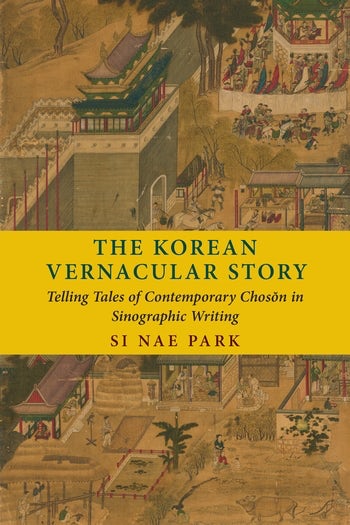
- This event has passed.
The Korean Vernacular Story: Telling Tales of Contemporary Chosŏn in Sinographic Writing
04/01/2021 @ 5:00 pm - 6:30 pm

Si Nae Park, Harvard University
Moderated by Jungwon Kim, Columbia University
Thursday, April 1, 2021
5:00 PM – 6:30 PM
Registration required.
Co-sponsored by Academy of Korean Studies; Department of East Asian Languages and Cultures, Columbia University
Abstract:
As the political, economic, and cultural center of Chosŏn Korea, eighteenth-century Seoul epitomized a society in flux: It was a bustling, worldly metropolis into which things and people from all over the country flowed. In this book, Si Nae Park examines how the culture of Chosŏn Seoul gave rise to a new vernacular narrative form that was evocative of the spoken and written Korean language of the time.
The vernacular story (yadam) flourished in the nineteenth century as anonymously and unofficially circulating tales by and for Chosŏn people. The Korean Vernacular Story focuses on the formative role that the collection Repeatedly Recited Stories of the East (Tongp’ae naksong) played in shaping yadam, analyzing the collection’s language and composition and tracing its reception and circulation. Park situates its compiler, No Myŏnghŭm, in Seoul’s cultural scene, examining how he developed a sense of belonging in the course of transforming from a poor provincial scholar to an urbane literary figure. No wrote his tales to serve as stories of contemporary Chosŏn society and chose to write not in cosmopolitan Literary Sinitic but instead in a new medium in which Literary Sinitic is hybridized with the vernacular realities of Chosŏn society. Park contends that this linguistic innovation to represent tales of contemporary Chosŏn inspired readers not only to circulate No’s works but also to emulate and cannibalize his stylistic experimentation within Chosŏn’s manuscript-heavy culture of texts.
The first book in English on the origins of yadam, The Korean Vernacular Story combines historical insight, textual studies, and the history of the book. By highlighting the role of negotiation with Literary Sinitic and sinographic writing, it challenges the script (han’gŭl)-focused understanding of Korean language and literature.
Si Nae Park is associate professor of East Asian languages and civilizations at Harvard University. She studies the literature, culture of texts, history of writing and reading, and linguistic thought of Chosŏn Korea (1392-1910) within the larger context of the Sinographic Cosmopolis. Her research specializes in the role of linguistic sensibilities in perception, conceptualization, production and diffusion of literature, literary historiography, and canon formation. Currently, she is working on a new book project to examine the impact of aurality and acoustic imagination in the late Chosŏn literary culture with a focus on Chosŏn vernacular novels (ŏnmun sosŏl) as vocalized books. Her first book, The Korean Vernacular Story: Telling Tales of Contemporary Chosŏn in Sinographic Writing (Columbia University, 2020), explores the rise of the vernacular story genre (yadam) in sinographic writing, challenging the script (han’gŭl)-focused understanding of Korean language and literature. She is the co-editor of Score One for the Dancing Girl and Other Stories from the ‘Kimun ch’onghwa’: A Story Collection from Nineteenth-Century Korea (University of Toronto Press, 2016).

